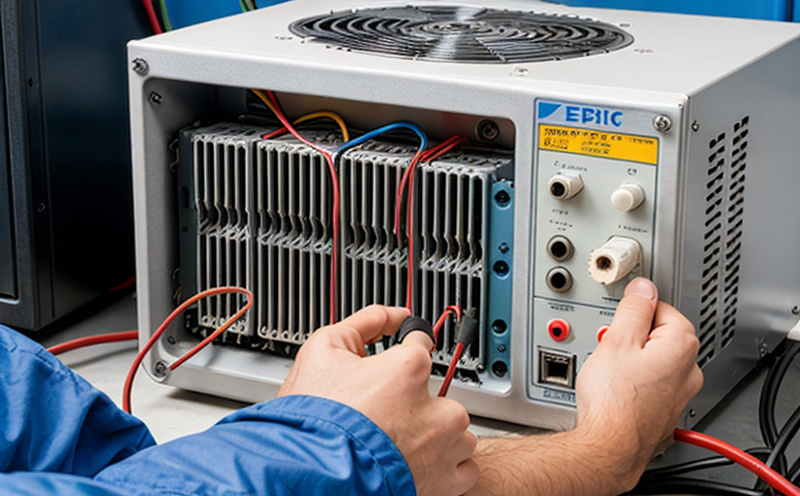IEC 61936 Insulation Coordination Testing of Ship Power Systems
The International Electrotechnical Commission (IEC) standard IEC 61936 is pivotal for ensuring the safety and reliability of electrical equipment in marine environments. This standard specifically addresses insulation coordination, a critical aspect that prevents overvoltage conditions from damaging power systems on ships. Insulation coordination involves selecting appropriate insulation levels to withstand potential overvoltages without failing or causing dangerous breakdowns.
Marine environments present unique challenges due to factors like humidity, salt spray, and high temperatures. These environmental stresses can compromise the integrity of electrical insulation, leading to failures that may endanger crew safety and operational continuity. IEC 61936 provides a framework for testing and certifying shipboard power systems to ensure they meet stringent requirements for insulation coordination.
During this testing process, various parameters are measured including dielectric strength, breakdown voltage, and flashover voltage. These tests simulate real-world conditions that the equipment may encounter during its operational lifecycle aboard ships. The standard also includes acceptance criteria that specify acceptable limits for each parameter to ensure compliance with safety regulations.
The testing typically involves subjecting a specimen representing the ship's power system to controlled overvoltages. This process allows engineers to assess how well the insulation can handle extreme conditions without failing. If the insulation passes all tests, it is considered capable of operating safely under marine conditions. Compliance with IEC 61936 not only ensures operational reliability but also helps in meeting legal and insurance requirements.
Marine quality managers, compliance officers, R&D engineers, and procurement professionals rely on this testing to ensure that the electrical equipment they specify or produce meets international safety standards. By adhering to IEC 61936, manufacturers can gain a competitive edge by demonstrating their commitment to product safety and reliability.
The following table provides an overview of some key aspects covered in IEC 61936:
| Aspect | Description |
|---|---|
| Overvoltage Conditions | Simulated conditions to test insulation under extreme marine environments. |
| Acceptance Criteria | Specific limits for dielectric strength and breakdown voltage. |
| Testing Methods | Variety of tests including impulse testing and flashover testing. |
| Insulation Coordination Levels | Selection of appropriate insulation levels to withstand overvoltages safely. |
The second table outlines the key benefits of adhering to IEC 61936:
| Benefit | Description |
|---|---|
| Enhanced Safety | Reduces risk of electrical faults leading to fires or other hazards. |
| Compliance with Regulations | Mandated by maritime safety authorities worldwide. |
| Improved Reliability | Ensures consistent performance under challenging environmental conditions. |
| Extended Equipment Lifespan | Prolongs the operational life of electrical components through robust design. |
Applied Standards
The IEC 61936 standard is widely recognized and applied in marine industries for insulation coordination testing. This section will delve into the specific standards that are commonly used alongside or in conjunction with IEC 61936.
- IEC 60287: International Electrotechnical Commission standard on voltage protection levels in low-voltage distribution systems, which provides a framework for voltage coordination.
- ISO 11419: Standard on the electromagnetic compatibility of ships and ship systems, offering additional context for understanding the broader electrical environment in marine settings.
- EN 50382: European standard on low-voltage switchgear and control gear, which can be relevant when integrating IEC 61936-tested components into larger systems.
The application of these standards ensures a holistic approach to electrical safety in marine applications. By adhering to multiple international standards, manufacturers and quality managers can ensure that their products meet the highest level of safety and reliability requirements.
Why Choose This Test
Selecting IEC 61936 insulation coordination testing for ship power systems is essential for several reasons. Firstly, it ensures compliance with international maritime regulations, which are crucial for maintaining operational legality and avoiding potential legal issues. Secondly, this testing provides a robust foundation for the safe operation of electrical equipment in harsh marine environments.
Marine quality managers appreciate the detailed insights provided by IEC 61936 into insulation performance under various overvoltage conditions. This information is invaluable for making informed decisions about procurement and design improvements. Compliance officers find it particularly useful as it supports their efforts to ensure that all equipment used on ships meets regulatory requirements.
R&D engineers benefit from the rigorous testing protocols described in IEC 61936, which help them develop innovative solutions that enhance both safety and efficiency. For procurement teams, this standard simplifies the process of selecting suppliers who adhere to the highest standards of quality and reliability.
The comprehensive nature of IEC 61936 makes it an indispensable tool for ensuring that ship power systems are not only reliable but also capable of withstanding the rigors of marine operations. By choosing this test, stakeholders in the marine industry can ensure they meet or exceed global standards, thereby protecting crew safety and operational integrity.
Quality and Reliability Assurance
To maintain the highest standards of quality and reliability in testing according to IEC 61936, several measures are implemented. These include meticulous specimen preparation, precise instrumentation calibration, and rigorous adherence to prescribed test protocols.
- Meticulous Specimen Preparation: The specimens used for testing must be representative of the actual ship power systems. This includes careful selection of materials, components, and configurations that mimic real-world conditions as closely as possible.
- Precision Calibration: All instruments used in testing are calibrated to ensure accuracy. Regular calibration checks are conducted to maintain precision throughout the testing process.
- Rigorous Adherence: Compliance with all prescribed test protocols is strictly enforced. Any deviations from standard procedures must be documented and justified before proceeding.
These measures ensure that the results of IEC 61936 insulation coordination tests are reliable and can be trusted by stakeholders in the marine industry.





